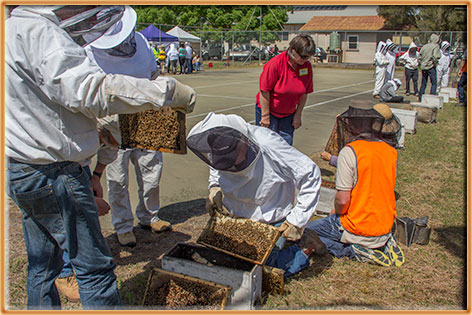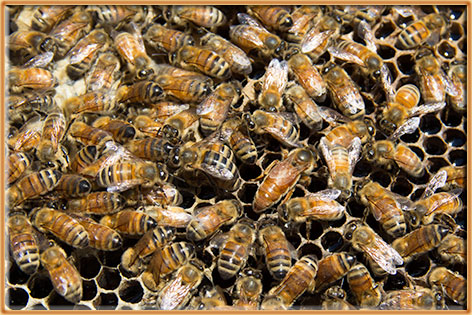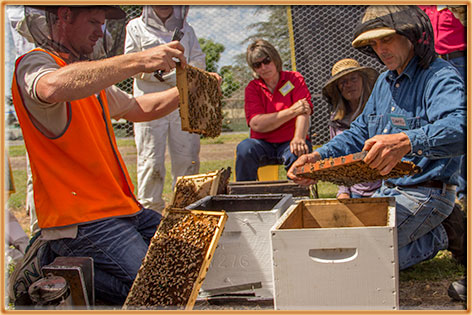Fun at the beekeeping field day, Swanpool
/Beekeeping continues to grow in popularity with hobbyists it seems. Yet there's a lot to learn and not many opportunities to gain experience, let alone 'give it a go' before you step into doing it yourself.
Last Sunday, for the third year in a row, the North Eastern Apiarists' Association (NEAA) ran a spring field day and workshops for new and prospective beekeepers. It was again very well attended, as you might expect. Participants ranged from those with just an idea they might like to keep bees, through to others who have hives and at least one with several decades of beekeeping experience.
The day consisted of a film screening and then a series of presentations and workshops. There was plenty of opportunity to have hands on time with the multiple hives that were set up along the edges of the tennis court and to discuss the many facets of getting started with backyard bees, and the spring time management of hives.

Image: nucleus hives set up along the tennis court with one of the groups working in pairs to check out each one, looking for the brood pattern, noting the features of the comb and observing the worker and queen bees and more.

Image: oh, there's the queen (yes easier in a nucleus colony; and indeed when I've cropped and focussed for you ... otherwise there's a distinct similarity to playing with a 'Where's Wally?' book to locate a single bee among tens of thousands!)
The presenters, NEAA members as well as Russell Goodman from the Department of Environment and Primary Industries, did a great job of focussing their discussion on beekeeping at the hobby scale. Sometimes they'd also explain why or how commercial beekeepers might address the same issue or topic. This is also of interest, but can be quite different to the approaches that are available and practical for backyard beekeepers. As always when talking beekeeping, it was reinforced there is no single 'right way', but instead a range of approaches and methods to care for and manage these astounding creatures.
It was interesting to note how the dozen or so other participants I knew at the event each took different things away from the sessions (as presumably, did all the attendees). Sometimes it was information that was new to them and others noted the value of the reinforcement and expansion on methods they'd heard or tried before. Attendees also took the opportunity to ask questions that might have been niggling or come up during their own beekeeping experience.
For sure, there's plenty to learn on the path to being a good beekeeper. There's no magic 'infusion' to gain all that information in one go. In fact, trying to take it all in can be one of the challenges for new beekeepers. For example, my Dad was attending this year for the third time. He said that as a newbie beekeeper the first year, he was pretty much lost after the first 15 minutes, having taken in as much information as he could process. By the second year, and with a little more experience, he said he was able to 'nod along' to perhaps 30 minutes of content plus add some new knowledge, before again struggling to process much more with his brain 'full' for the day. And this year? He said on the day he'd made it to 45 minutes of reinforcing information and picked up new tips from there [and revised that to an hour in hindsight!] … which I think means he'll be getting along to plenty more beekeeping sessions if they come up. But good on him, and all the attendees, for looking to keep learning and to consolidate what they have experienced, too.

Image: simulating the re-queening process and hive splitting ... where is that queen?
A highlight for me was Linton Briggs' presentation on flora for beekeeping. Mr Briggs has decades and decades of experience noting the flowering patterns of local plants, both native and exotic, as well as their roles in nectar and pollen provision for honeybees. He's like a talking ecology encyclopaedia, only more animated, with simple explanations and always coming back to the implications of his observations in terms of the bees.
It made me reflect on what I've learnt in the mere five years since I started trying to observe and note the flowering patterns of plants in my own garden and area (eg here and here). This too began as a tool for beekeeping, and has led to so many other things for me since then! While I am an utter beginner compared to the charming and inspiring Mr Briggs, I agree wholeheartedly with his assertion that observing the patterns of flora over seasons, years and locations is a truly "enriching experience". So too, noted Mr Briggs, is cultivating your connection with the natural world through beekeeping.
I extended my thanks to the presenters and organisers. I appreciate that running an event like this takes considerable time and energy, at a busy time of year for those with their own apiaries and businesses to run. I hope the NEAA will continue to run similar events and that they will attract yet more prospective, new and even experienced hobby beekeepers. The opportunity to learn and share is invaluable.


